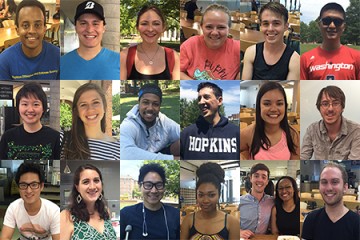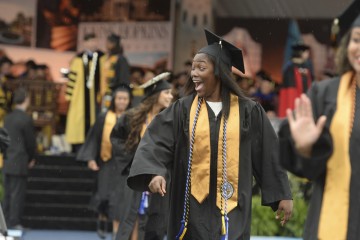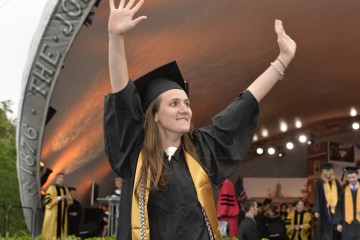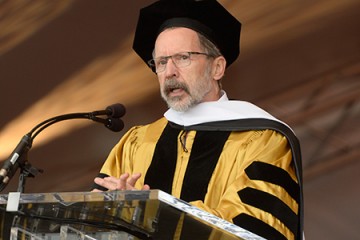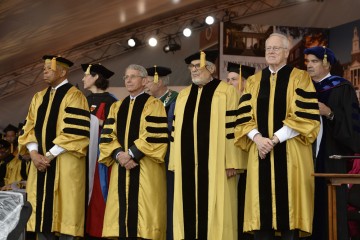Remarks as prepared for Johns Hopkins University President Ronald J. Daniels for the universitywide commencement ceremony on May 21, 2015.
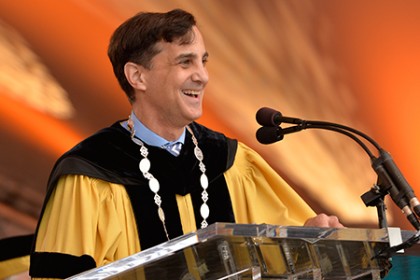
Image caption: Johns Hopkins University President Ronald J. Daniels
Image credit: James VanRensselaer / Homewood Photography
To our honorary degree recipients, alumni, and trustees … to our faculty and staff, to our parents, family members and friends … and most especially to our graduates … welcome to the Johns Hopkins University Commencement for the great Class of 2015!
Today, I want to talk about stories—yours and ours.
Each of us sees ourselves—not surprisingly—as the protagonist of our story. So it's natural to assume your stories begin and end with you.
At Hopkins, you experienced some seismic shifts.
Literally.
You entered the university during a hurricane … and then an earthquake, and showed typical Hopkins inventiveness and initiative by substituting regularly scheduled—mandatory, I daresay—orientation activities with mudslides on the beach.
In your ensuing four years, Brody Atrium replaced the A level, air conditioning came to the AMRs—a truly remarkable feat of advanced engineering that one could not even have dreamed of—and kale chips briefly bumped Doritos off the CharMar shelves… These were times of great moment. Clearly.
Now, more seriously, your college years are ending—at a time that is once again seismic.
Each of us who learns, works and lives here in Baltimore has been touched in some way by the unrest that roiled our city just before your final exams began.
Recently, in a jam-packed Shriver Hall here on the campus, journalist and West Baltimore native Ta-Nehisi Coates spoke about race in America, and the legacy of generations of discrimination that has emanated from our country's founding flaw of violent enslavement.
He observed that we enter the grand narratives of our time midstream.
The stories don't start with us. Other characters were there before. Decisions were made. Dynamics unleashed. Ideas, cultures, and systems are already deeply entrenched.
Coates reminded us that the root causes of the rage we saw that night are not only of this moment, and will not be changed quickly. The complex and pernicious matrix of discriminatory housing policy, disparate educational opportunity, and mass incarceration has lasted decades and will not be undone without sustained and determined effort.
A few days after Baltimore's unrest, I confided my concerns about the situation in our city to my dearest friend and mentor who lives back in Canada.
He listened attentively as I enumerated, in painstaking and vivid detail, the various challenges buffeting Baltimore. And then, when I finished, he uttered two simple words: "critical junctures."
Now, perhaps the import of that phrase is not self-evident. Nor is the sense of radical possibility it conveys. So let me explain.
It starts with the social scientist's idea of path dependency.
The idea is that policies, institutions, and customs arise in response to a certain set of starting conditions. And even when those starting conditions recede and are no longer relevant, the policies, institutions and customs that were created in their shadow, and which were long ago outdated and unjust, tend to persist—sometimes over decades, sometimes even over centuries. This is so because people become rooted in these familiar paths. Rather than endure the disruptions, the costs of, and adjustments to what is desirable change, they will opt to stick with what they know. They will opt for the status quo.
And yet, every so often, we arrive at a moment that is so wrenching, so deeply unsettling that it makes the status quo untenable, and there is an opening for real and profound reform.
Not even the heavy weight of history can thwart its logic.
These are "critical junctures."
And when they happen, all bets are off.
Suddenly, the seemingly inexorable flow and rhythm of the story halts, and we have the chance to break with the past and change the course of the narrative. We can get off the path.
The unrest of late April sparked a critical juncture here in Baltimore, and the response we see in our city reveals and will reveal much about the character of our community.
Yes, our city's challenges—like our nation's—are daunting, complex, and persistent. But there is now a sense of palpable possibility. Things can—things must—change.
Over the last several weeks, I have seen glimmers of the movement, of the instinct, of the yearning for change.
Baltimoreans, of all stripes, are talking, they're convening, they're organizing, they're dreaming—with fierce determination and a can-do scrappiness—to embrace the imperative for reform in so many different contexts: more summer jobs for our city's youth, better schools and skills development programs, and criminal justice reforms, to name a few. And I believe that sustained change is possible so long as our collective resolve and shared optimism holds firm—that we are unshakeable in our commitment to change. In one year's time, imagine the progress we could make. Imagine the excitement and hope we could unleash if we were to show that here in Baltimore we began to bring better health, better education, and more jobs to our most challenged neighborhoods. That would truly be a national news story of note.
For those of you who are staying in Baltimore, let's seize this moment together. Your city needs your ideas, your energy, and your optimism.
For those of you who are going elsewhere know this: Though critical junctures don't happen often, they can happen anywhere and anytime.
Graduates, your role—Hopkins education in hand—is to be open to that moment and embrace the radical possibility it entails.
No matter where or when you enter a story, your critical thinking will allow you to build better institutions and policies. Your research will bring better health to vulnerable populations. And your artistry will compel us to more deeply understand our common humanity.
When the moment arrives, and you face a critical juncture, we need you to be vigorous, bold, and smart in championing the truths you have discovered and which you hold dear.
We are so, so proud of you all.
Godspeed—and congratulations to the great Class of 2015!
Posted in University News, Student Life
Tagged commencement, president ron daniels, commencement 2015




